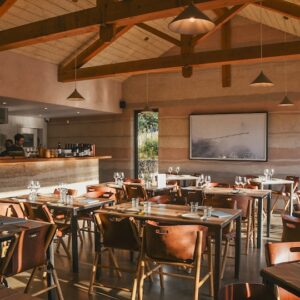
Deputy Front of House Manager
This is a fantastic opportunity for a dynamic, enthusiastic, talented and passionate manager looking for a new challenge and to make a difference to the
Home / Beaver exploring the Adur landscape
With the best of intentions the release of two beavers into their new home in the rewilding project at Knepp Estate in West Sussex in mid-November, was not publicised. A quiet release saw beavers return to Sussex after a 400-year absence.

Both Knepp Estate and Sussex Wildlife Trust agreed that for ecological and conservation reasons the beavers were best left with minimal disturbance in order to settle into their new home. Once safely established, an announcement would be made in the spring. So, no fanfare accompanied the momentous arrival. The beavers, however, have made their own debut!
Beavers are notorious for their explorative natures, especially as they orientate themselves in a new landscape and work out territory boundaries. Even though their extensive and abundant terrain at Knepp has been reinforced with fencing, electric wire and grilles at strategic points to prevent them heading downstream to join the main river Adur, a beaver (the male of the Knepp pair) has recently been recently spotted on the Adur, North of Lancing (Worthing Herald 9th December 2020) – the first beaver to swim in the Adur for over 400 years.

Sir Charles Burrell of the Knepp Estate said: “Beavers are very good at existing under the radar in the slower, deeper parts of catchments, and we’re anticipating that he’s found a quiet part of the Adur, probably in an area that contains plenty of willow. We’re keen to retrieve him from where he’s currently living and bring him back home to Knepp, where a mate awaits him.”
Henri Brocklebank, Director of Conservation at Sussex Wildlife Trust, says: “We are asking local people to play a role in getting this beaver (nicknamed Bramber) back to Knepp. Although free-living beavers are a great ambition for Sussex in the future, the Knepp release is licensed, so Bramber needs to be retrieved”.
Please remember:
• Beavers are nocturnal. If you know you are near a beaver during the day, please stay as quiet as possible and behave as unobtrusively as possible.
• Please respect landowners and avoid disturbance to the beavers by keeping to public footpaths and by following the Countryside Code.
• Please keep dogs on leads. Although beavers are not aggressive, if attacked by a dog they may fight back.
If you see what you think could be a beaver on the Adur or any of its streams, please let Knepp Estate know. Do not try and approach it or disturb it. A beaver is a wild animal and will be collected by a professional team that will return it to Knepp.
If you do spot any potential feeding signs (or even Bramber himself) we would be very grateful if you could email penny@knepp.co.uk with the following information:
This information will be very much appreciated and will help us locate Bramber.



Once the beavers are fully established at Knepp, we look forward to sharing much more about these remarkable creatures and their role as ecosystem engineers but, for now, we just want to get ‘Bramber’ home.
For frequently asked questions about beavers please visit the Sussex Wildlife Trust beaver webpage

This is a fantastic opportunity for a dynamic, enthusiastic, talented and passionate manager looking for a new challenge and to make a difference to the

The year begins by plummeting us into a deep freeze – snow and ice lay over the country for a week, shadowed by biting arctic

We are looking for an engaging and passionate Shop Manager to join our team and help take the shop in exciting new directions, including possibly
Knepp Wildland Safaris, our gardens and campsite are all about the quiet and patient observation of nature.
Some of the species we are likely to encounter are shy or can be frightened by loud noises or sudden movements. Our campsite with open-air fire-pits, wood-burning stoves and an on-site pond is unsuitable for small children.
For this reason, our safaris, garden visits, holiday cottages and campsite are suitable only for children of 12 and over.
You’ll receive relevant offers and news by email. This will include information about the Rewilding Project, online store products, the Wilding Kitchen Restaurant / Cafe, and other exciting experiences / events across the Knepp Castle Estate. For more information, view our Privacy Policy.